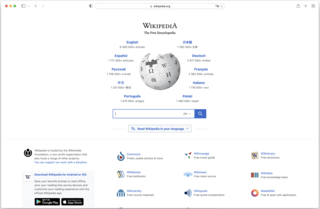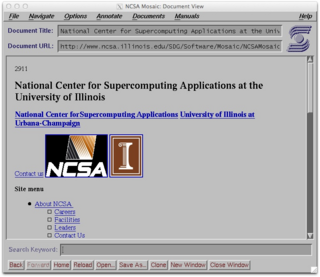
The HyperText Markup Language or HTML is the standard markup language for documents designed to be displayed in a web browser. It defines the meaning and structure of web content. It is often assisted by technologies such as Cascading Style Sheets (CSS) and scripting languages such as JavaScript.

The Internet is the global system of interconnected computer networks that uses the Internet protocol suite (TCP/IP) to communicate between networks and devices. It is a network of networks that consists of private, public, academic, business, and government networks of local to global scope, linked by a broad array of electronic, wireless, and optical networking technologies. The Internet carries a vast range of information resources and services, such as the interlinked hypertext documents and applications of the World Wide Web (WWW), electronic mail, telephony, and file sharing.

Sir Timothy John Berners-Lee, also known as TimBL, is an English computer scientist best known as the inventor of the World Wide Web, the HTML markup language, the URL system, and HTTP. He is a professorial research fellow at the University of Oxford and a professor emeritus at the Massachusetts Institute of Technology (MIT).

The World Wide Web (WWW), commonly known as the Web, is an information system that enables information sharing over the Internet through user-friendly ways meant to appeal to users beyond IT specialists and hobbyists. It allows documents and other web resources to be accessed over the Internet according to specific rules of the Hypertext Transfer Protocol (HTTP).

A web browser is an application for accessing websites. When a user requests a web page from a particular website, the browser retrieves its files from a web server and then displays the page on the user's screen. Browsers are used on a range of devices, including desktops, laptops, tablets, and smartphones. In 2020, an estimated 4.9 billion people have used a browser. The most used browser is Google Chrome, with a 65% global market share on all devices, followed by Safari with 18%.
Web most often refers to:

A website is a collection of web pages and related content that is identified by a common domain name and published on at least one web server. Websites are typically dedicated to a particular topic or purpose, such as news, education, commerce, entertainment or social networking. Hyperlinking between web pages guides the navigation of the site, which often starts with a home page. As of May 2023, the top 5 most visited websites are Google Search, YouTube, Facebook, Twitter, and Instagram.

In computer network communications, the HTTP 404, 404 not found, 404, 404 error, page not found, or file not found error message is a hypertext transfer protocol (HTTP) standard response code, to indicate that the browser was able to communicate with a given server, but the server could not find what was requested. The error may also be used when a server does not wish to disclose whether it has the requested information.

NCSA Mosaic is a discontinued web browser, and one of the first to be widely available. It was instrumental in popularizing the World Wide Web and the general Internet by integrating multimedia such as text and graphics. It was named for its support of multiple Internet protocols, such as Hypertext Transfer Protocol, File Transfer Protocol, Network News Transfer Protocol, and Gopher. Its intuitive interface, reliability, personal computer support, and simple installation all contributed to its popularity within the web. Mosaic is the first browser to display images inline with text instead of in a separate window. It is often described as the first graphical web browser, though it was preceded by WorldWideWeb, the lesser-known Erwise, and ViolaWWW.

The deep web, invisible web, or hidden web are parts of the World Wide Web whose contents are not indexed by standard web search-engine programs. This is in contrast to the "surface web", which is accessible to anyone using the Internet. Computer scientist Michael K. Bergman is credited with inventing the term in 2001 as a search-indexing term.
Archive is a collection of historical records.
Wot, WOT, WoT or wot may refer to:
Google is an American multinational corporation specializing in internet-related services and products.

The World Wide Web is a global information medium which users can access via computers connected to the Internet. The term is often mistakenly used as a synonym for the Internet, but the Web is a service that operates over the Internet, just as email and Usenet do. The history of the Internet and the history of hypertext date back significantly further than that of the World Wide Web.
WWW is the World Wide Web, a system of interlinked hypertext documents accessed via the Internet.
Agora was a World Wide Web email browser and was a proof of concept to help people to use the full internet. Agora was an email-based web browser designed for non-graphic terminals and to help people without full access to the internet such as in developing countries or without a permanent internet connection. Similar to W3Gate, Agora was a server application designed to fetch HTML documents through e-mail rather than http.
Web archiving is the process of collecting portions of the World Wide Web to ensure the information is preserved in an archive for future researchers, historians, and the public.









